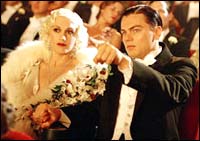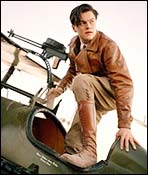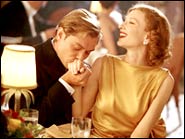 By any account, Howard Hughes was one of the most colorful, enigmatic, infuriating, and towering figures in the second quarter of the 20th century. Scandal magazines and even mainstream publications always chased him for vivid stories. Interest in him intensified as his germophobia and dementia continued to be widely discussed, and he went on to be one of the most reclusive men in the world, starting in the late 1940s.
By any account, Howard Hughes was one of the most colorful, enigmatic, infuriating, and towering figures in the second quarter of the 20th century. Scandal magazines and even mainstream publications always chased him for vivid stories. Interest in him intensified as his germophobia and dementia continued to be widely discussed, and he went on to be one of the most reclusive men in the world, starting in the late 1940s.
There was speculation in the early seventies that he had been living as a monk in the Himalayas, leading to one of the most elaborate hoaxes of the decade -- when rising writer Clifford Irving sold to McGraw Hill and Time magazine what was purported to be an as-told-to-Irving autobiography of Hughes. But the fake would be uncovered only at the penultimate moment of its publication.
It's hard to believe that Hughes, the billionaire aviation pioneer and Hollywood producer who wooed some of the most beautiful and powerful women in the movies, actually died a loner, repeatedly watching James Bond films, shooting cocaine and letting malnutrition consume his body.
| |||||||||||
The movie stretches from the late 1920s through the 1940s, when Hughes was directing and producing expensive Hollywood movies and test flying aircraft he had designed.
Though not too many people will remember Hughes and his times today, and may find The Aviator's story line a bit remote, there is enough suspense and drama, with adequate visual moments and fairly good performances to keep even the 20+ generation occupied for most of the movie's near three-hour duration.
Many Hollywood insiders and trade observers had wondered -- and not without good reason -- if DiCaprio could bring Hughes alive on the big screen. Those who have studied Hughes extensively and visually may feel DiCaprio as unable to flesh out all the man's complexities. But that is partly the script's and Scorsese's fault.
 Suffice it to say, that, while the argument continues on who could have done a better job of portraying Hughes, DiCaprio has given an intense performance. If his work does not strike as something startling, it is simply because the film has a number of well-etched performances that threaten to dwarf DiCaprio's superb work.
Suffice it to say, that, while the argument continues on who could have done a better job of portraying Hughes, DiCaprio has given an intense performance. If his work does not strike as something startling, it is simply because the film has a number of well-etched performances that threaten to dwarf DiCaprio's superb work.
Scorsese, who, two decades ago, used to make intense and claustrophobic kind of films that Clint Eastwood now makes with great success (Million Dollar Baby), continues to be enthralled by grandeur. And yet, despite an increasing preoccupation with huge sets, soaring visuals and outrageous drama, he is still committed to making films with compelling plot lines. If only he had cut his current film by about 30 minutes, he would have received much better critical acclaim. And perhaps a better box-office reception as well. Without a raft of Oscar nominations and then a few key winnings, the film that reportedly cost $110 million will have a hard fight to break even.
Scriptwriter John Logan and Scorsese do not waste much time, following a prologue about Hughes's early years, to place him in Hollywood in the late 1920s where Hughes is making the war drama Hell's Angels, that almost eats up his family fortune.
However misguided Hughes may seem, slowly one gets to admire his passion for the film, and Scorsese, known for his own obsessions with filmmaking, lovingly recreates the tension, drama and excitement involved in the creation of Hell's Angels.
We also see Hughes in the company of many attractive women including Katherine Hepburn (a terrific Cate Blanchett) and Ava Gardner (a fine Kate Beckinsale).
The breakup of his relationship with Hepburn brings out Hughes' meaner streak, as he seeks out a blackmailer (Willem Dafoe) who threatens to sell pictures of Hepburn and her married, Catholic lover, Spencer Tracy, to a scandal rag. But the ploy failed as Hepburn and Tracy had a very long relationship.
Hughes' bigger and newer obsession saves his sanity, at least for a few years, as he gets involved with aviation. And this new passion provides Scorsese an opportunity to create many minutes of spectacle and drama.
 One of the most dazzling scenes in the film involves a plane crash that nearly killed Hughes. Another sequence is the confrontation, Hughes, who runs TWA, has with Pan Am's Juan Trippe (Alec Baldwin, one of the most underestimated actors, emoting brilliantly). Both are fighting to have the most of the international business, and soon politics enters the scene.
One of the most dazzling scenes in the film involves a plane crash that nearly killed Hughes. Another sequence is the confrontation, Hughes, who runs TWA, has with Pan Am's Juan Trippe (Alec Baldwin, one of the most underestimated actors, emoting brilliantly). Both are fighting to have the most of the international business, and soon politics enters the scene.
In one of the most rousing scenes ever to feature DiCaprio, the actor has to confront Senator Ralph Owen Brewster (a solid Alan Alda) at a Congressional hearing on corruption in assigning government contracts. For a long time, the briskly edited segment will be remembered for its fierce drama and fine acting. Watch DiCaprio's reaction when his character is branded a war profiteer. But the real scene-stealer here is Alda.
If only the last quarter of the film, including an unconvincing climax, had been as good






 © 2025
© 2025